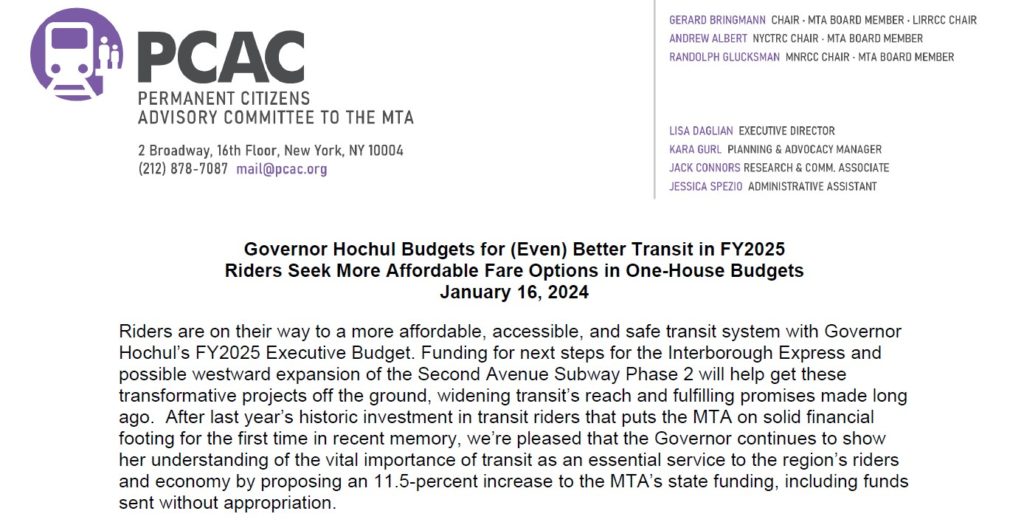Riders are on their way to a more affordable, accessible, and safe transit system with Governor Hochul’s FY2025 Executive Budget. Funding for next steps for the Interborough Express and possible westward expansion of the Second Avenue Subway Phase 2 will help get these transformative projects off the ground, widening transit’s reach and fulfilling promises made long ago. After last year’s historic investment in transit riders that puts the MTA on solid financial footing for the first time in recent memory, we’re pleased that the Governor continues to show her understanding of the vital importance of transit as an essential service to the region’s riders and economy by proposing an 11.5-percent increase to the MTA’s state funding, including funds sent without appropriation.
The Governor’s overall theme of affordability carries over from her State of the State to the Executive Budget. A strong workforce and economy rely on access to jobs and housing, and her budget includes proposals to make New York the nation’s leader in these areas. Making New York an Employment First state and bringing more people with disabilities into the workforce will mean ensuring they can get to work and job training when they need to – including during peak travel times. It’s critical that discount fares for disabled and senior riders on the LIRR and Metro-North be expanded to include morning peak hours, currently the only time when the discount fare isn’t valid. Similarly, bringing Fair Fares to the commuter rails in New York City – using city funding – would further expand access to job training and employment.
We support the Governor’s proposal to forgive a rider’s first fare evasion summons if they enroll in Fair Fares and urge the legislature to include it in their one-house budgets while we work towards expanding Fair Fares to the commuter rails within New York City. We also pledge to work with our elected leaders on the creation of a weekly CityTicket that includes free transfers to subways and buses. Not only would this commonsense, economically-progressive fare make commuting more affordable, particularly as congestion pricing comes online, it would ensure that New Yorkers in subway deserts like Southeast Queens and parts of the Bronx are not priced out of the commuter railroads that run through their neighborhoods. As we look to congestion pricing, it’s crucial to ensure that there are mechanisms to make toll evaders and fraudsters pay; we look forward to learning more.
We thank the Governor for her inclusion of incentives for localities to build housing near commuter rail stations so that riders can afford to live close to the transit they depend on. We agree that ‘Transit Oriented Development makes all the sense in the world.’ Hopefully the third time is a charm, and this is the year of much needed consensus to address the housing crisis that affects our economic growth and prosperity.
We look forward to working with the Governor and legislature to advance a more affordable and accessible region and expansive transit system and thank the elected leaders in Albany for continuing to prioritize riders this year.
